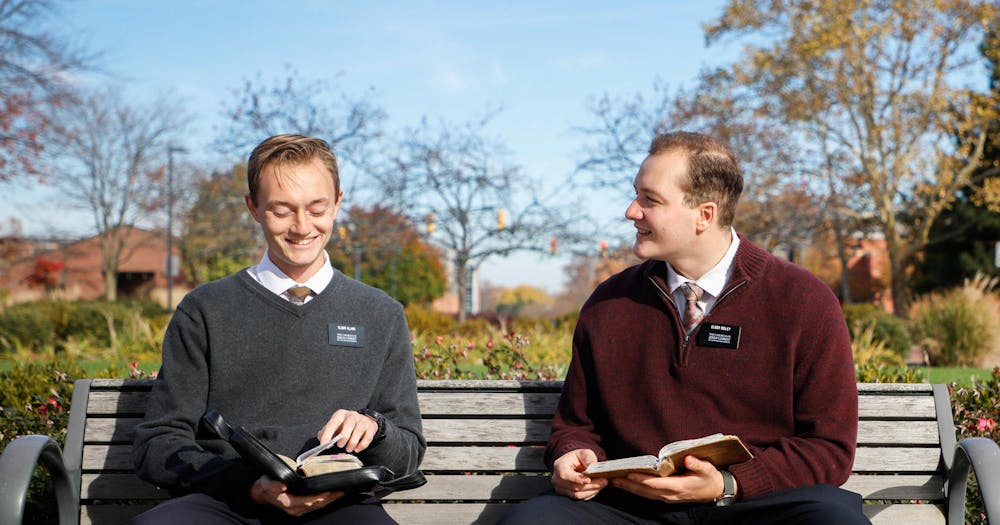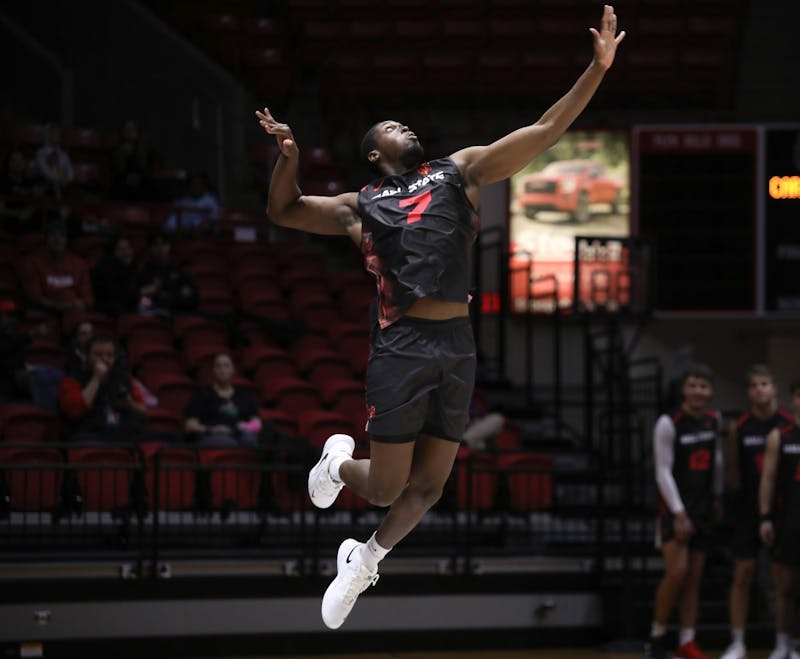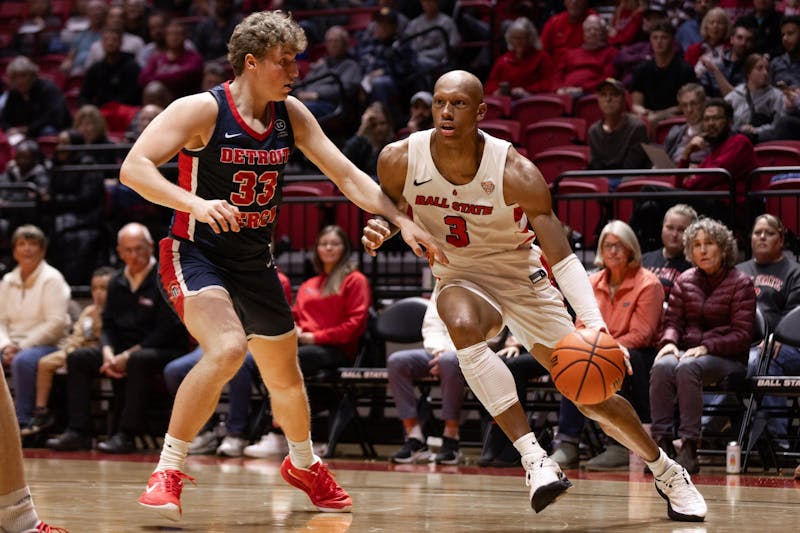White shirts, dress pants and wide smiles: it’s an iconic look, one many students of Ball State University are keenly familiar with. For some, missionaries from the Church of Jesus Christ of Latter-day Saints are as much a staple of life on campus as Greek’s Pizzeria or surprise rain showers.
But despite their commitment to open dialogue, it can be a struggle to maintain their place amidst growing ideological and religious polarization. A 2023 survey from the Pew Research Center found 59 percent of Americans are unsure what to think of the church, while a quarter hold an outright negative view of practitioners.
Elder Michael Clark is a missionary from Oregon; his companion, Elder Jaxon Wallace, is from Utah. Together, they are fighting back against that stigma.
“We've talked with a number of students,” Wallace said. “They've been super friendly. It's actually been really good. We came out to find some ways to serve the people here in Muncie, so we're looking to do that.”
Missionaries from the Church of Jesus Christ of Latter-day Saints are paired in groups of two, as per a passage from their Scripture in The Doctrine and Covenants. They are separated by gender and assigned to each other by their mission president: a high-ranking priest within the community.
It’s a process that, at least for these two elders, seems to have worked well.

Elder Bobby Seiley and Elder Michael Clark pose for a photo Nov. 7 under the Bell Tower on Ball State Campus. Andrew Berger, DN
Both were raised within the faith from a young age, and said they found a lot of reassurance in its teachings. That is what they’re ultimately seeking to share with students.
“We don't get paid to do this,” Clark said.“We love coming out and inviting others to learn. We’re not here to force people; we are just here to invite people to learn, to grow, to hear what we believe and really to learn about Jesus.”
Clark has been on his mission for nearly 20 months; For Wallace, it’s close to 24. The two aren’t the only Latter-day Saint missionaries on campus, however.
Sisters Jezreel Franco and Lauren Louther are more recent arrivals; Franco has been in Muncie since July, whereas Louther arrived just a few weeks ago. Despite this, the two echoed Wallace’s sentiments about the atmosphere on campus.
“A lot of people here have been very nice, very open and receiving,” Louther said. “They may not agree right off the hand. That's OK. Not everybody does. I don't expect them to, but they've been respectful, nice and generous.”
After listening with a smile, Franco nodded in agreement and offered her own thoughts.
“I really appreciate those who stop and take the time to listen to us,” Franco said. “They’re very kind and very understanding. Again, as [Louther] said, sometimes you don't agree, but you can be respectful about it.”
Like the elders, the two sisters come from different states. Louther is from Utah and Franco is from California. Despite this, both found their duty calling them to Indiana.
Louther began her mission in Columbus, Indiana; Franco began hers in Carmel, Indiana. From there, they moved all across the state: Zionsville, Indianapolis, Kokomo, Terre Haute and Elkhart. But it was in Muncie that their paths converged, and the two found themselves companions.
In regard to the selection process, Franco laughed and said, “It would be awesome,” to get to choose her companion.
“But we believe that we are selected by divine revelation,” Franco said. “The mission president – he goes to God, he prays about it and he receives revelation or guidance on who should go where, and who should be with whom; so that’s how we got together.”

LDS Missionaries Elder Michael Clark and Elder Bobby Seiley talk while walking Nov. 7 on Ball State campus. Andrew Berger, DN
Missionaries can change companions over the course of their mission, especially as they move from one location to the next. Wallace recently finished his, leaving Clark to partner up with new arrival Elder Bobbi Seiley. The memories the two made, however, will stay.
Franco, Clark, Wallace and Louther all expressed a sense of holy purpose: a duty to share the lessons and love of their faith. But in fulfilling that duty, they’ve walked a path many college students will find familiar: they left their homes, traveled the country, made new friends and — above all else — changed.
“I think I’ve experienced a lot of character development on my mission,” Louther said. “ I feel like that was an essential part in my life. It’s not only uplifting spiritually, but also in all these other aspects, that turn you into the person you need to become.”
Many misunderstand the teachings of the church, confusing it with its fundamentalist counterpart; they associate it with practices abandoned decades ago, like arranged marriages and polygamy. But more than that, there’s a misunderstanding about its members.
The same Pew Research Center poll that found a quarter of Americans reported a negative view of the church surveyed members of the denomination on their opinion of other faiths. It found they did not express a net negative opinion of any other religious group, being strongly positive towards several.
College can be isolating. It can be intimidating to reach out and try to make friends, and students often struggle to balance their social lives with their studies. But when it comes to meeting new people, there’s one group on campus that is always open to talk.
They wear white shirts, dress pants and wide smiles — and they’re here to stay, until their two years are up, or they are transferred.
Contact Colin Brown with comments at colin.brown@bsu.edu.





The Daily News welcomes thoughtful discussion on all of our stories, but please keep comments civil and on-topic. Read our full guidelines here.